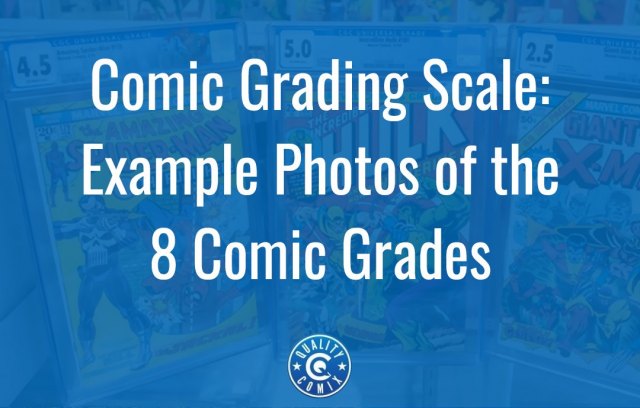![[Guide] How to Authenticate Signatures on Your Comic Books](https://www.qualitycomix.com/images/size_l/news-000132.jpg)
Browsing your comic book collection, you may notice that some of them are signed. Maybe you had them signed, and you're well aware of this fact. Maybe they were signed when you bought them, either as part of a bulk collection or individually. Maybe the signature was a selling point, or maybe it was incidental. Either way, you have signed books. There's just one question: is the signature legit?
A signature can be one of many things.
- A real, genuine signature.
- A signature stamp, which could have been stamped by the individual whose signature it is, or not.
- A printed signature, which was often a marketing gimmick and isn't a real signature.
- A forgery, where someone mimics the signature of a noteworthy individual to try to increase the value of a book.
Genuine signatures can add value to a book in some circumstances. Consider the late, great Stan Lee. Stan Lee was an exceptional man, and the mark he made on comics, in general, will remain for all time. It's no wonder that thousands of people had him sign various books he had some involvement with.
Of course, since he passed, no more comics will have his signature if they don't already have it. Anyone who hoped to have his signature as part of their collection can no longer get it in person and will need to obtain it second-hand. That makes those signed books potentially more desirable, at least to those collectors.
How can you validate a signature and verify that it's authentic? Unfortunately, this is quite difficult.
Table of Contents
Option 1: You Were There
The first way to tell if a signature is legit is if you were the person who had it signed and you were there to see it in person.
The trouble with this is that it's just your word that it was signed by the person whose signature is on the book. Anyone else would need to trust you in your claims.
Sometimes, the person signing the book also issues certificates of authenticity to prove that they signed it. These can lend veracity to your claims, but just as a signature can be forged, so too can a certificate of authenticity, even if it's harder to do so. Also, the vast majority of people signing books don't provide those certificates.
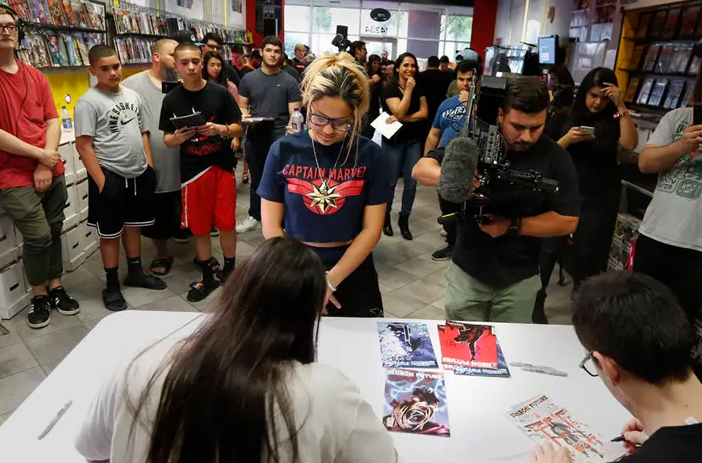
Image source: Google Images
This doesn't always matter. If you want to sell a book with a signature you know is authentic, you can sell it raw, and anyone who doesn't believe you will simply not buy the book.
In the case of specific, noteworthy books and signatures, the provenance can be followed. A chain of ownership can be recorded, and the history tracked. This isn't likely to be the case with a major individual like Stan Lee, who signed many thousands of items throughout his years on the convention circuit and various public events. It's a lot more likely with collectibles that have smaller markets, like indie publications.
Unfortunately, simply being present for the signature only authenticates the signature to you. No one else has any distinct reason to trust your word, which is a problem if you're trying to sell (or grade) the book.
Option 2: Witnessed Signatures
CGC, and to an extent, the other grading companies, offer a witnessed signature service. This service is generally available at conventions where noteworthy individuals are present and signing various items. In exceptional cases, you can also work with CGC directly to have them come and witness and verify a signature, usually for high-end books worth a significant amount.
The idea is this. While you personally witnessing a signature has no authority behind it, CGC's authority is tangible. They have a witness physically present when you have your book signed. Then, they take possession of it, grade it, and slab it then and there. You're then given a book with the yellow Signature Series label. This book is forever enshrined in CGC's list of authorized signed books, with a unique identifier to make sure the book is verified as authentic.
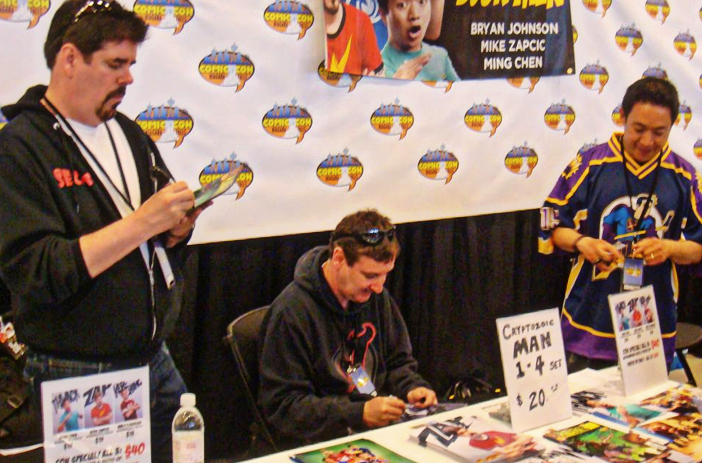
Image source: Google Images
Now, obviously, a witnessed and certified signature is the best option, but it's only an option if you're getting the book signed in a position where a CGC official can be there. If your book is already signed, CGC can't validate the signature.
In fact, CGC has a label for this: it's their dreaded Green label, the Qualified label. The Qualified label is usually used for some kind of major defect to the comic that might not affect its grade significantly. For example, a book where a coupon was cut from the pages might not have the grade reduced because of it (especially if it's a very common defect), but the label indicates the defect is present. Signatures that aren't verified are given this label, with the line NAME WRITTEN ON COVER WITH MARKER (or whatever the specific location would be.)
Unfortunately, a green label comic is often not worth anywhere near as much as a comic with a standard blue or gold label. Since the signature isn't verified (and since the green label can indicate other kinds of defects), it is inherently not as desirable and, thus, not as valuable.
One thing to note here is that even if you have a certificate of authenticity or some other "proof" that your signature is valid, CGC doesn't care. If they weren't there to witness it, they're going to give it a green label, and that's that. Often, you might be better off not getting it graded at all or grading it through a different company.
Option 3: CBCS Validation
In the world of signatures, there are a lot of different ways to try to validate the authenticity of an item. Paintings have their signatures (and their styles, materials, and other details) analyzed to provide validation. Other kinds of collectibles have validation services. So why not comics?
Well, until relatively recently, it was mostly just an oversight. Now, though, CBCS provides a signature validation service provided by their parent company, Beckett Media.
If you have a signed comic and you want the signature validated, this is pretty much the only option you have available to you. CBCS will validate the signature, then grade and slab the comic with their own yellow label, intentionally chosen to be reminiscent of the CGC golden label.
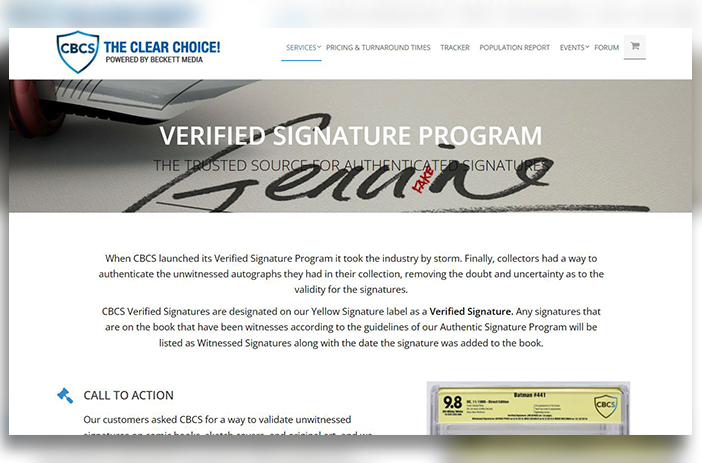
Image source: https://www.cbcscomics.com/verified-signature-program
How does this validation service work?
First, you submit the comic to CBCS through their usual grading system, with the additional $20 fee tacked on for signature validation. Then, you send the comic to their headquarters. Once there, experts in signature authentication will examine the signature and will try to make a determination whether or not it's authentic.
The question is, what will the CBCS validation experts look for? They don't fully outline their process, but validating signatures isn't a new science, so here are some of the most likely details:
- Comparison to existing known signatures. CBCS has a library of what are called "exemplars," which are examples of signatures that are verified and show characteristics of the handwriting of the person signing, and can be used to compare to an unknown signature to look for similarities.
- Signs of stamping. Sometimes a signature is a stamp rather than a real signature. This often shows in uneven ink distribution, and a lack of any signs of motion, as well as potential spatters and surrounding drips. A stamp isn't necessarily invalid – especially if the individual used stamps rather than hand signatures for a reason – but often stamps are made to forge signatures, so it can be a red flag.
- Inconsistencies in ink. This is most noteworthy for older signatures. Older inks can degrade and oxidize over time, and black ink can start to fade and turn brown. If a signature that is supposedly decades old hasn't shown signs of this degradation over time, it's less likely to be a legitimate signature.
- Too much perfection. No one is perfect, and anyone signing their name will have tiny variations. If a signature is too perfect, it can be an indication of a forgery.
- Timelines. Sometimes, a story just doesn't add up. A signature from 1990 might be considered invalid if the person doing the signing was known to not sign anything until 1995, passed away in 1985, had a different style of signature in that era, or even just didn't actually attend the convention where the comic was supposedly signed. While the movements of every writer, artist, and creator certainly aren't 100% tracked, some historical records can be used to validate signatures or invalidate others.
- Personalization. Often, forged signatures are simply signatures; those with doodles, full art, and personalized messages are less common and more easily identifiable and, thus, more likely to be authentic. The more text is present, the more evidence there is to spot a fake, too.
All of this combined will help the authentication experts at Beckett to determine whether or not the signature is likely to be authentic. Now, they won't often say it's not; sometimes they will, especially if it can be verified to be a stamp or clearly fraudulent in some way, but most often, they'll simply say they couldn't authenticate it.
Is it Worth Getting a Comic Signed?
This is a highly personal question.
Some people love signed comics. They like the connection between the person involved in its creation and the item itself. Whether it's the creator of the character, the writer of the story, the artist involved, or even something like the actors who portrayed the characters in the source material, signatures can have a personal connection and value outside and beyond that of the actual monetary value of the signature and the book.
In fact, often, the value of a signed book is sentimental and part of the memories of the experience of meeting a fantastic creator.
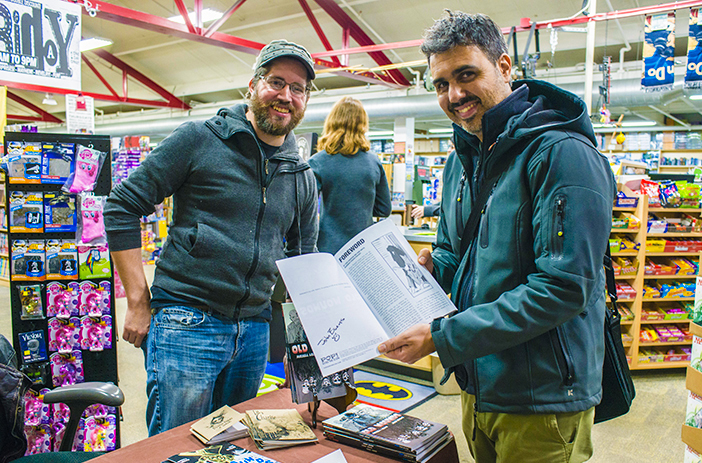
Image source: Google Images
Of course, sentimentality doesn't add zeroes to a price on eBay, does it? Some people get books signed, usually by noteworthy individuals like Stan Lee, in a bid to increase the value of the book for resale. In these cases, the witnessed signature service is essential. Obviously, though, it wasn't always available and still isn't if you meet outside of a convention.
Should you get your comics signed? Sure, if you want to. Sometimes it increases resale value, especially if you get a witnessed grade and a signature series label. Alternatively, if you just want the signature as part of your personal collection and don't care about the resale value, you can certainly get the signature.
Should You Get Signed Books Graded?
This one is up to you.
Sending a signed book to CGC is going to get you the green label, and the green label may or may not be worth anything. Sometimes, with noteworthy books and signatures (and with accompanying proof, even if CGC doesn't accept it), it can be a boost to resale value. CBCS, if they can authenticate a book, has proven that their authentication is valuable and the resale is worth it.
Those are basically your two options. You either get the green label from CGC, or you see what CBCS and Beckett think of the signature and either get their standard blue or their verified yellow.
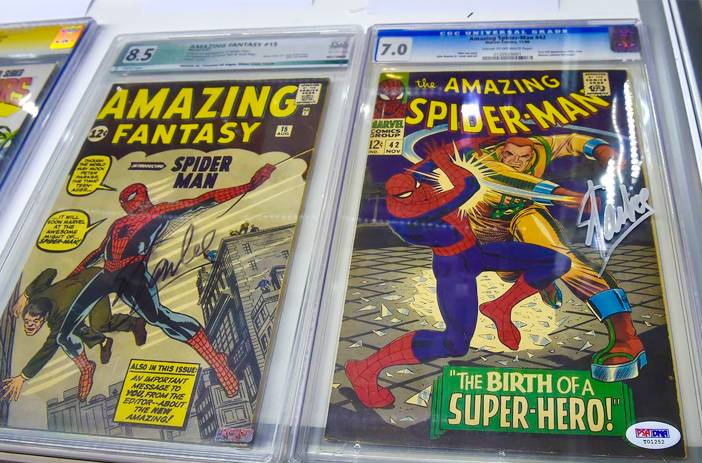
Image source: Google Images
Other than that, of course, it's your choice. Sometimes, selling a signed book raw is going to be just as valuable, and you offload the decision-making to the buyer.
Do you have other specific questions about comics? Do you have a signed collection and want our opinions? If you do, please don't hesitate to reach out and contact us. We aren't authenticators, but we can give you our best guess and help advise you on what to do next. Just drop us a line; we love to chat about all things comics, and we're always here to answer your questions. You can also sell your comics through us, and we'll even give you a free, no-pressure, no-obligations quote if you just describe your collection to us. We look forward to hearing from you and can't wait to assist you however we possibly can.
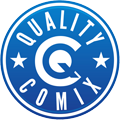
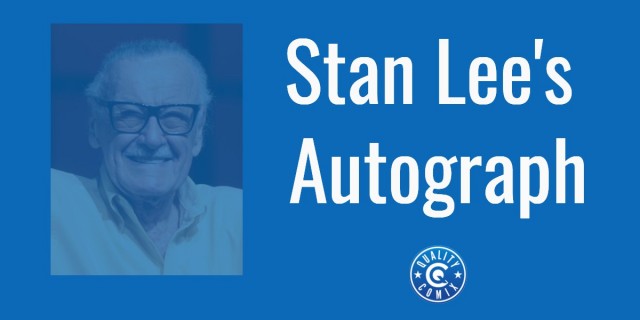
![[Guide] Where is the Best Place to Get Your Comics Graded?](https://www.qualitycomix.com/images/size_f/news-000079.jpg)
